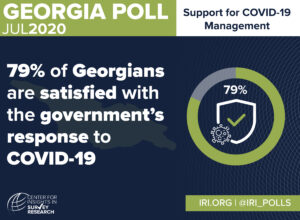
Credit: NDI shutterstock_552516817 (1)
This weekend’s election in Georgia is seen as a litmus test of legitimacy for the ruling Georgian Dream Party (GD) and as a referendum on party leader Bidzina Ivanishvili’s oligarchic rule, observers suggest.
Georgian political analyst Ghia Nodia (below) says the public is seeking to change the country’s experience of “one dominant power” being replaced by another at every election since its independence from the Soviet Union in 1991. Saturday’s vote will decide “whether we will keep the existing semi-autocratic dominant-power politics, or switch to a more pluralistic and open system that may [or may not] lead us to a full democracy,” he told Al Jazeera.
“Currently in Georgia, most champions of democracy pin their hopes on this institutional innovation,” but forming a coalition government in the current political landscape is not going to be easy, said Nodia, a former Reagan-Fascell Fellow at the National Endowment for Democracy, who delivered the 13th Annual Seymour Martin Lipset Lecture on “The Crisis of Postnationalism.”
 The vote will come down to a choice between two very contrasting visions: Georgians will either vote for the ruling party’s increasing tilt towards strategic approximation with Russia or for the country’s long-standing drive towards Euro-Atlantic integration, argue Miro Popkhadze, a Fellow at the Foreign Policy Research Institute, and Batu Kutelia, the Vice President of the Atlantic Council of Georgia and a Next Generation Leader Fellow at the McCain Institute for International Leadership:
The vote will come down to a choice between two very contrasting visions: Georgians will either vote for the ruling party’s increasing tilt towards strategic approximation with Russia or for the country’s long-standing drive towards Euro-Atlantic integration, argue Miro Popkhadze, a Fellow at the Foreign Policy Research Institute, and Batu Kutelia, the Vice President of the Atlantic Council of Georgia and a Next Generation Leader Fellow at the McCain Institute for International Leadership:
Considering the growing unease in its relationship with Western partners, the ruling party’s reelection could dramatically reshape Georgia’s strategic orientation. It could even lead to the deterioration of the country’s relationship with both the United States and the European Union, while transforming its allegedly covert and indirect coordination with Moscow into an overt partnership and strategic realignment.
Given the United States’ sizable investment in Georgia’s democratization and Westernization over the past three decades, Washington cannot afford to see Georgia’s democratic backsliding or its return to Russia’s sphere of influence, they contend.
Georgian parliamentary elections are due tomorrow, notes analyst David Lidington. In a recent report, the Washington-based National Democratic Institute (NDI) warned that while Georgia had proved “its technical capacity to conduct credible elections… persistent issues related to electoral integrity have remained unaddressed”, sapping public confidence in Georgian democracy and leaving the country more vulnerable to outside interference, he adds:
 Earlier this month 17 Georgian NGOs called for a formal investigation into alleged Russian subversion of the political process. The International Society for Elections and Democracy (IFSED), based in Tblisi, has catalogued incidents of politically motivated violence, harassment and intimidation. New York’s Committee to Protect Journalists has condemned physical attacks on Georgian TV reporters and crews.
Earlier this month 17 Georgian NGOs called for a formal investigation into alleged Russian subversion of the political process. The International Society for Elections and Democracy (IFSED), based in Tblisi, has catalogued incidents of politically motivated violence, harassment and intimidation. New York’s Committee to Protect Journalists has condemned physical attacks on Georgian TV reporters and crews.
Although the 2020 parliamentary elections will occur amidst a rare moment in modern world
history — during a global pandemic — they nevertheless present an opportunity for Georgia to
road test the reforms that could see an increase in political and gender diversity in parliament,
issue-based political negotiation and the possibility of a new coalition government after
decades of single-party domination, says the International Republican Institute’s pre-election assessment.
 Can Georgia Deliver Democratic Elections? analyst Kornely Kakachia asks for Ponars Eurasia:
Can Georgia Deliver Democratic Elections? analyst Kornely Kakachia asks for Ponars Eurasia:
While recent public opinion surveys see the Georgia Dream firmly in the lead, it is rather unclear whether the ruling party will receive enough votes to build a government unilaterally, or whether Georgia will, for the first, see a coalitional government. Georgia has also witnessed another trend in the last few years: the emergence of a critical mass of swing voters who could decide the outcome of any election. According to an August survey commissioned by NDI, as many as 59 percent of voters are undecided. Thus, the majority of the population feels disillusioned with governmental policies and not supportive of opposition parties.
Furthermore, Georgia’s media environment is among the freest and most diverse in the region, but it is highly polarized, potentially impacting citizens’ ability to make informed electoral choices. Media outlets often find it difficult to secure participation from all major parties for debates and political discussion shows, adds NDI’s second Georgia election watch bulletin. NDI’s international virtual election integrity program conducts its activities in a nonpartisan, professional manner, in accordance with Georgian law and the Declaration of Principles for International Election Observation, with the support of the U.S. Agency for International Development (USAID) and the National Endowment for Democracy (NED).
The Atlantic Council hosts a webinar on “Georgia’s Post-Election Outlook.” Panelists: Thomas de Waal, senior fellow at Carnegie Europe; Lincoln Mitchell, adjunct research scholar at Columbia University; Melinda Haring, director of the Atlantic Council’s Eurasia Center and former NED Penn Kemble Fellow; Nino Ghvinadze, fellow at the Atlantic Council’s Eurasia Center; and Laura Linderman, senior fellow at the Atlantic Council’s Eurasia Center. 9:30 a.m. November 2, 2020. Webinar registration available here.







